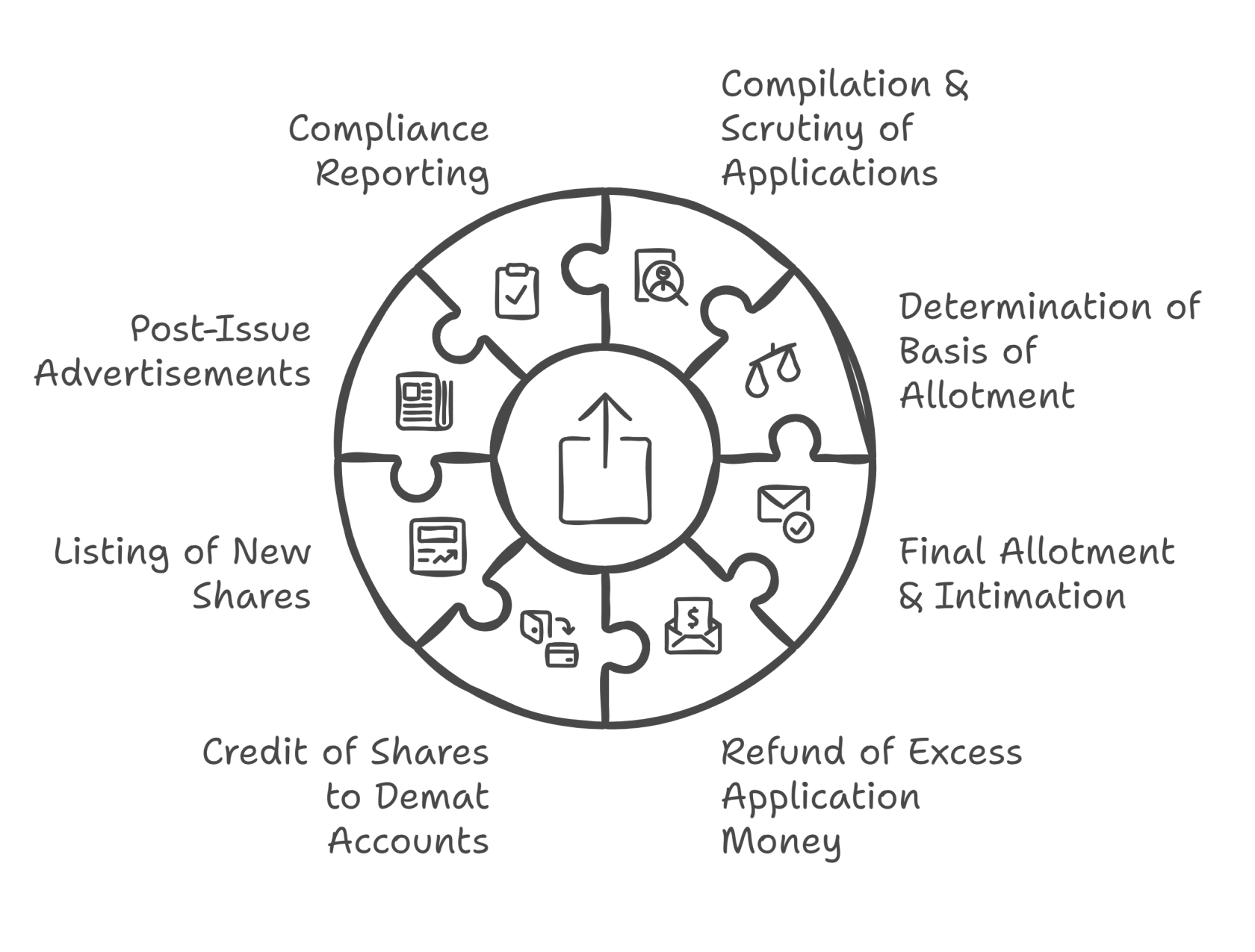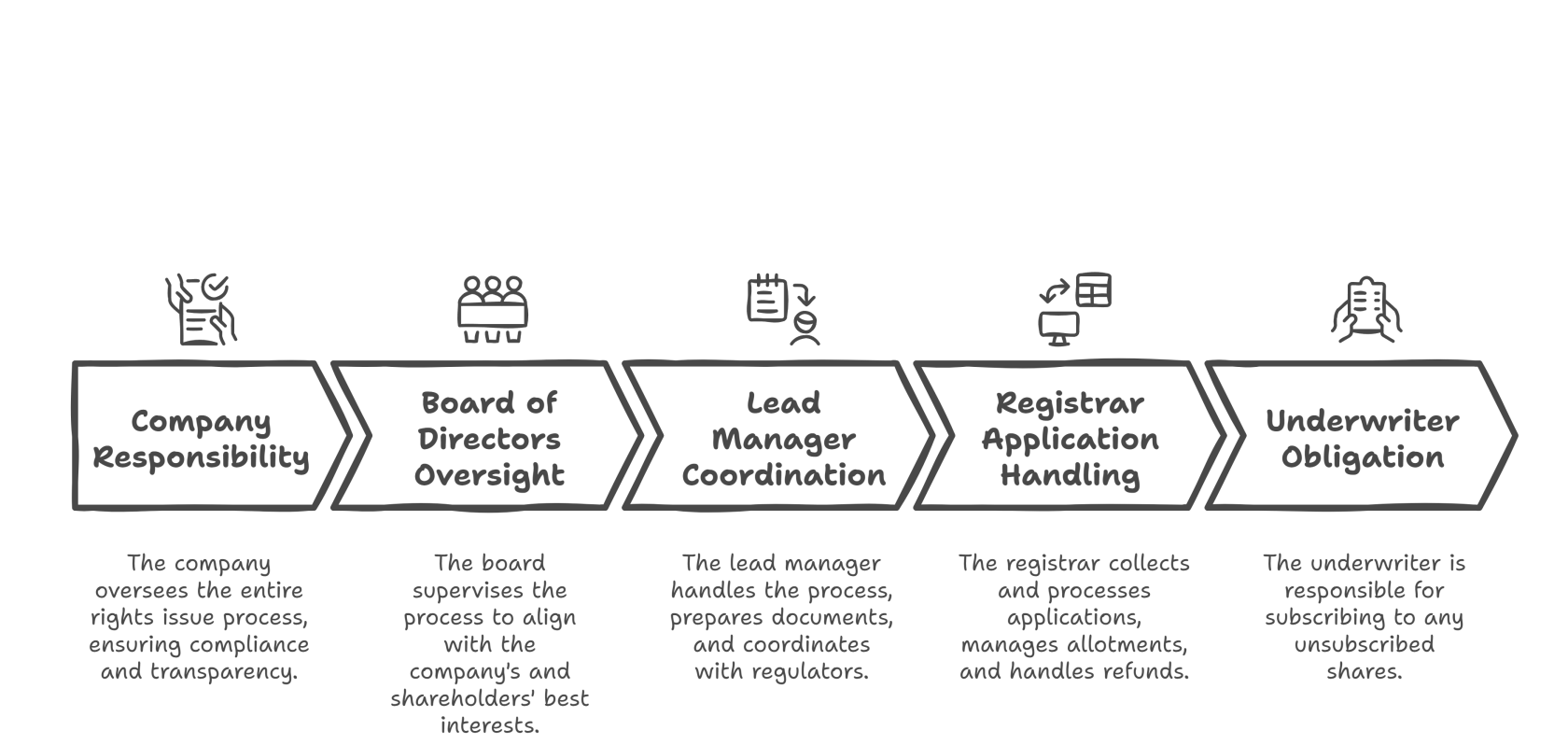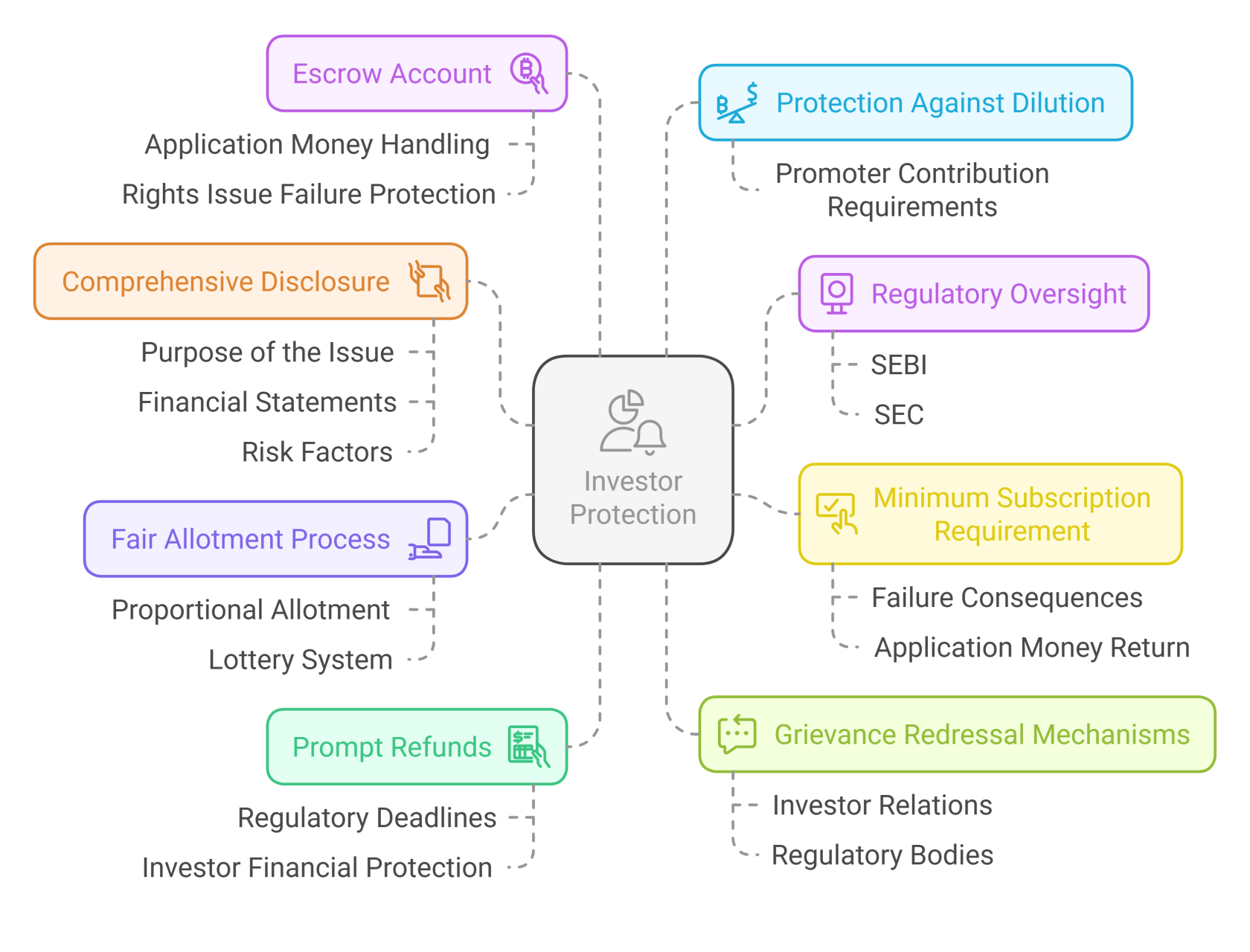Rights Issue: Post-Issue Work, Obligations, Protection
Rights Issue: Post-Issue Work & Obligations
After the subscription period for a rights issue closes, the company and its appointed intermediaries (like lead managers or merchant bankers) embark on a series of crucial tasks to finalize the issue and ensure the new shares are delivered to investors. This phase demands meticulous attention to detail and adherence to regulatory timelines.
I. Key Post-Issue Activities:
-
Compilation & Scrutiny of Applications:
- Task: The Registrar to the Issue (often a specialized company) collects all the application forms received from shareholders. These are then meticulously checked for completeness, accuracy, and eligibility.
- Details: The Registrar verifies details like the shareholder's demat account information, signature, and the number of shares applied for.
- Why Important: Ensures accurate record-keeping and prevents fraudulent applications.
-
Determination of Basis of Allotment:
- Task: Determining how shares will be allotted. If the issue is undersubscribed (fewer applications than shares offered), everyone who applied will likely get the shares they requested. If the issue is oversubscribed (more applications than shares offered), a fair and transparent allotment process is used.
-
Details: The method of allotment is usually specified in the offer document. Common methods include:
- Proportional Allotment: Allotting shares to all applicants in proportion to their existing shareholding.
- Lottery System: If proportional allotment is not possible, a lottery system may be used to select eligible applicants.
- Why Important: Ensures fairness and transparency, particularly when demand exceeds the supply of shares.
-
Final Allotment & Intimation:
- Task: After determining the basis of allotment, the company finalizes the allotment list. Successful applicants are informed about the number of shares allotted to them.
- Details: Allotment advice or notices are sent to investors, typically via email and postal mail. This notice contains details like the number of shares allotted, the amount due (if any), and the date by which the shares will be credited to their demat account.
- Why Important: Confirms the outcome of the application process to shareholders.
-
Refund of Excess Application Money:
- Task: If an applicant applied for more shares than they were allotted (due to oversubscription), the excess application money must be refunded.
- Details: Refunds are typically processed electronically via NEFT/RTGS (in India) or similar electronic transfer methods in other countries. The refund should be processed promptly, as delays can attract interest penalties.
- Why Important: Ensures fairness and adheres to regulatory requirements. Delayed refunds can damage the company's reputation.
-
Credit of Shares to Demat Accounts:
- Task: Crediting the newly allotted shares to the successful applicants' demat accounts.
- Details: The shares are credited electronically, eliminating the need for physical share certificates. The Registrar works with the depositories (like NSDL and CDSL in India) to ensure accurate and timely credit.
- Why Important: Enables investors to trade the new shares quickly and easily.
-
Listing of New Shares:
- Task: Ensuring the new shares are listed on the stock exchange(s) where the company's existing shares are traded.
- Details: The company needs to obtain approval from the stock exchange(s) for listing the new shares. Once listed, the shares become freely tradable.
- Why Important: Provides liquidity to the investors holding the new shares and allows them to buy or sell them on the open market.
-
Post-Issue Advertisements:
- Task: Publishing advertisements in newspapers or on the company's website to inform the public about the successful completion of the rights issue, the number of shares allotted, and the listing date.
- Details: These advertisements serve as a formal announcement to the market.
- Why Important: Enhances transparency and provides information to investors who may have missed the initial offer.
-
Compliance Reporting:
- Task: Submitting various reports to regulatory bodies (like SEBI) regarding the progress and completion of the rights issue.
- Details: These reports include details about the number of applications received, the allotment process, the amount of funds raised, and any deviations from the original plan.
-
Why Important: Ensures accountability and compliance with regulatory requirements.

II. Obligations of Key Parties:
- Company: Ultimately responsible for the entire rights issue process, including adherence to regulations, fairness, and transparency.
- Board of Directors: Accountable for overseeing the rights issue process and ensuring it's in the best interests of the company and its shareholders.
- Lead Manager/Merchant Banker: Responsible for managing the rights issue process, preparing the offer document, coordinating with regulatory bodies, and advising the company on pricing and allotment.
- Registrar to the Issue: Responsible for collecting and scrutinizing applications, determining the basis of allotment, processing refunds, and crediting shares to demat accounts.
-
Underwriter (if any): Obligated to subscribe for any unsubscribed shares at the issue price.

Investor Protection in a Rights Issue: Shielding Your Investment
A rights issue offers existing shareholders a chance to buy more shares at a discounted price. But what safeguards are in place to protect investors during this process? Let's break down the key elements of investor protection:
Why is Investor Protection Important?
Rights issues, while beneficial in some cases, can also be risky. Companies might use them to raise money because they're struggling financially, or the terms of the issue might not be favorable to existing shareholders. Investor protection measures are designed to ensure fairness, transparency, and informed decision-making.
Key Elements of Investor Protection:
-
Comprehensive Disclosure (The Offer Document is Key!):
- What: The company must provide a detailed offer document (letter of offer or prospectus) that discloses all material information about the rights issue.
- Why: Enables investors to make an informed decision. It's illegal for companies to hide important information or make misleading statements in the offer document.
-
Key Disclosures (As discussed before):
- Purpose of the issue (why is the company raising money?)
- Financial statements and key ratios
- Risk factors (potential downsides of investing)
- Use of proceeds (how will the money be spent?)
- Rights ratio (how many new shares can you buy?)
- Issue price and subscription period
- Minimum subscription amount
-
Regulatory Oversight:
- What: Regulatory bodies like SEBI (in India), the SEC (in the US), or similar organizations in other countries monitor the rights issue process to ensure compliance with rules and regulations.
- Why: Prevents fraud, insider trading, and other unethical practices.
- How: They review the offer document, investigate complaints, and can take action against companies that violate regulations.
-
Minimum Subscription Requirement:
- What: The company must raise a minimum amount of money for the rights issue to proceed.
- Why: Protects investors from a situation where the company raises insufficient funds to achieve its stated objectives. If the minimum subscription isn't met, the rights issue fails, and all application money is returned.
-
Fair Allotment Process:
- What: The allotment of shares (deciding who gets how many) must be fair and transparent, especially if the issue is oversubscribed.
- Why: Prevents favoritism and ensures all eligible shareholders have an equal opportunity to participate. Common methods include proportional allotment or a lottery system.
-
Prompt Refunds of Excess Application Money:
- What: If an investor applies for more shares than they are allotted, the excess application money must be refunded promptly.
- Why: Protects investors from unnecessary delays and financial losses. Regulatory bodies often set deadlines for refund processing.
-
Grievance Redressal Mechanisms:
- What: Investors have avenues to file complaints and seek redressal if they face issues during the rights issue process (e.g., delayed refunds, incorrect allotment, misleading information in the offer document).
- Why: Provides a mechanism for resolving disputes and holding companies accountable.
- How: Investors can contact the company's investor relations department, the Registrar to the Issue, or the regulatory body.
-
Escrow Account:
- What: Application money received from investors is often held in an escrow account until the allotment process is finalized.
- Why: Prevents the company from using the funds prematurely and protects investors' money if the rights issue fails.
-
Protection Against Dilution (Sometimes):
- What: While not always guaranteed, some jurisdictions or company policies may offer mechanisms to limit excessive dilution of existing shareholders' ownership.
- Why: To maintain the balance of power and prevent massive changes in share ownership.
-
How: Promoter contribution requirements can help prevent excessive dilution.

Investor Responsibilities:
While these protections are in place, it's crucial for investors to be proactive:
- Read the Offer Document Carefully: Don't skip this step! It contains vital information.
- Understand the Risks: Be aware of the potential downsides of the rights issue.
- Seek Professional Advice: If you're unsure about anything, consult with a financial advisor.
- Ask Questions: Don't hesitate to contact the company or the Registrar if you have any queries.
- Act Promptly: Submit your application and payment before the deadline.
- Keep Records: Maintain records of your application and payments.
In summary, investor protection in a rights issue is a multi-layered approach involving regulatory oversight, disclosure requirements, fair processes, and grievance redressal mechanisms. By being informed and proactive, investors can safeguard their interests and make well-informed decisions.

No Comments